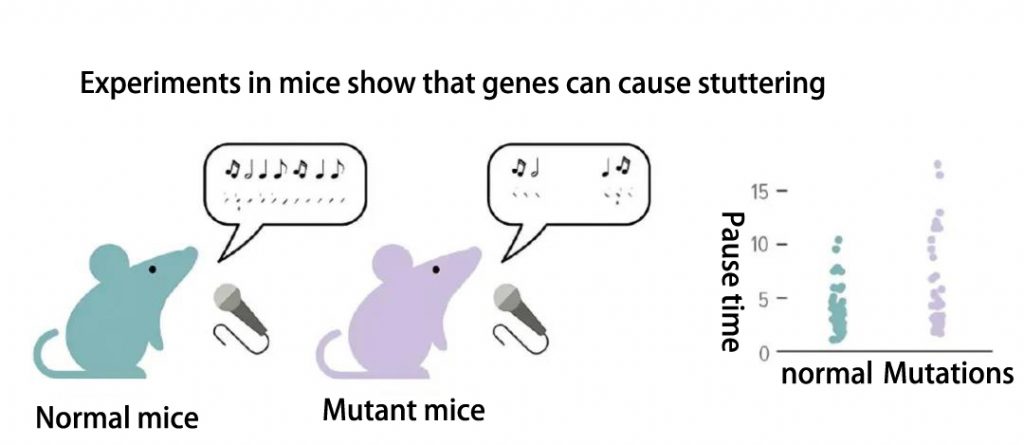
Humans have been bitter for a long time. Think about it, if you are a college student who is about to graduate and are standing on the podium of the defense; if you are a TV host, you are explaining a lively football game; if you are a salesperson, you are preparing to explain to customers The advantages of the product… In the face of people who are full of expectations, you are so blushing that you can’t even tell the opening remarks. What a torture is this!

How to solve the big problem of stuttering? In recent years, scientists finally have some good ideas.
Stuttering and the cerebral nervous system
Stuttering is not uncommon in the crowd. Children who speak babble often have short-term stuttering because of “forgetting words”. About 5% of preschool children have stuttering. As the age grows, 70% to 80% of people’s stuttering symptoms will automatically disappear, but about 25% of people will not be cured for life, and the number of patients accounts for about 1% of the population.
Stuttering is essentially a physical defect, but it does not cause physical pain to people. It only causes long and deep psychological pain in specific situations or to people engaged in specific occupations. So, should it be classified as a mental illness or a physical illness? First of all, we must understand the cause of stuttering. For a long time, scientists have grouped the cause of stuttering with other mental illnesses, and believed that environmental factors were the fundamental cause of stuttering. The autobiographical film “The King’s Speech” of King George VI of the United Kingdom thus hints at the reasons why George suffered from stuttering: a slightly depressed childhood, neglected intimacy, and the experience of being corrected left-handed… This is the same as stuttering in real life. The patient’s experience is very similar, and it seems to be in line with the scientist’s point of view.
However, gradually, scientists discovered that the impact of the environment on stuttering was overstated. Congenital factors brought about by premature birth or genes, combined with acquired factors such as stress and trauma, collectively “shape” stuttering. Scientists first explored from the level of neural mechanism.
Stuttering is caused by problems in multiple areas of the brain. In 1996, neuroscientists at the Texas Health Center in the United States found for the first time that the left hemisphere auditory cortex responds weaker than ordinary people when stuttering patients. This reveals that hearing impairment may lead to language output obstacles, which is one of the reasons for stuttering. one. A brain MRI study of patients with stuttering in 2009 once again proved that not only in the speech stage, but even in the stage of receiving language information, the brain functions of stuttering patients are not as active as normal people, and the two affect each other.
The researchers also found that the gray matter volume, white matter fibers, and connection pathways in the brain of stuttering patients showed different patterns from those of normal people. Their language center gray matter components were less, and the brain connection fibers were weaker than other people. This means that normal people may be able to say things without thinking, but patients with stuttering need the help of other areas of the brain, and they can only say it after thinking. This will naturally show the phenomenon of repetition or delay of speech-a typical manifestation of stuttering.
Stuttering and genes
If the relationship between stuttering and the brain is fairly clear, how genes cause stuttering really puzzles scientists. In 2001, American geneticist Dennis Delrena began to associate genes with stuttering. He discovered the genetic law of stuttering in a chief family in Cameroon, Africa. In this polygamous family, there are a total of 22 children, and all of them have a mild or severe stuttering phenomenon, which is difficult to explain only from environmental or brain differences.

Drena finally found four genes that may be related to stuttering: GNPTAB, GNPTG, NAGPA and AP4E1. In patients with stuttering, they all have mutations. Drena uses mice to verify whether these genes are really related to stuttering. He mutates related genes in the mice and observes the mice’s vocalization. Drena sees the desired result. Although the genetically modified mouse is still vocalizing, its companions are often indifferent, as if they can’t understand it. The researchers analyzed the sound of the genetically modified mice with a sonicator and observed a pattern similar to the population eating, that is, the same syllable is repeated continuously or the pause time between different syllables is longer.
This seems to verify the idea that the above genes do cause stuttering, but the strange thing is that the function of these genes has nothing to do with pronunciation, but plays the role of transporting necrotic cells to an organelle called lysosomes for cell self-destruction. The role of. So why do their mutations cause stuttering?
Drenner tried to find the changes in the brain of the genetically modified mouse, and finally found that it had fewer astrocytes than other mice. Astrocytes provide energy and nutrients to other brain cells and transmit information. The reduction in their number will slightly slow down the speed of information transmission between the left and right hemispheres of the brain. Its impact is only on activities that require multi-regional linkage of the brain such as speech. To be noticed. The reason for the decrease in the number of astrocytes is probably due to genetic mutations. The necrotic cells no longer “suicide” but are congested in their original positions. The new glial cells have nowhere to go, and the final number is decreased.
The congestion of necrotic cells can cause the accumulation of sugar and fat, leading to abnormal bone development and severe learning disabilities, which also proves that stuttering genes do affect vocalization.
A new treatment for stuttering
Now that scientists have found out the physiological cause of stuttering, are there any targeted treatments? For the past 25 years, as a “senior” stuttering patient, American psychiatrist Gerald Maguire has been researching drugs to treat stuttering, and now he has made some progress.
Maguire started to treat stuttering from a new perspective: reducing dopamine activity. Dopamine is a neurotransmitter that increases or decreases neuronal activity. There are five different dopamine receptors in the brain (named D1, D2, etc.). Depending on the type and location of the receptor, dopamine does not work. Same. Through brain scans of patients with stuttering, Maguire found that the activity of dopamine in the patient’s brain was too high, and the excess dopamine inhibited the activity of certain brain areas related to stuttering. Other researchers also found that people who overexpress the dopamine D2 receptor gene are more likely to stutter.

Therefore, Maguire began to use some psychotropic drugs to inhibit dopamine activity, which was successful in some small clinical trials, but unfortunately they can cause some side effects, such as gaining weight, causing muscle stiffness and dyskinesia. Maguire believes that this may be because these drugs act on D2 dopamine receptors. To this end, he specially developed a new drug called ecopipam, which inhibits D1 receptors, and he hopes that this drug can alleviate some side effects. In a small study with only 10 volunteers, Maguire found that the stuttering symptoms of people taking ecopipam improved significantly.
Ecopipam is not the only new type of treatment. There are also experts who are trying to stimulate specific parts of the brain with electrodes, aiming to strengthen the connection between that part and the part that manages speech movement, so as to improve the fluency of language expression.
Of course, drug therapy and electrode stimulation are more suitable for patients with congenital stuttering. If stuttering is caused by acquired environmental trauma, then behavioral therapies commonly used in psychotherapy, including breakthrough therapy to speak boldly, speech therapy to slow down the rate of speech, and silent therapy to speak less, may all improve the symptoms of stuttering.
As a disease caused by multiple factors, people have a very simple understanding of stuttering, but we must believe that after hard work, stuttering can be overcome.
Comments